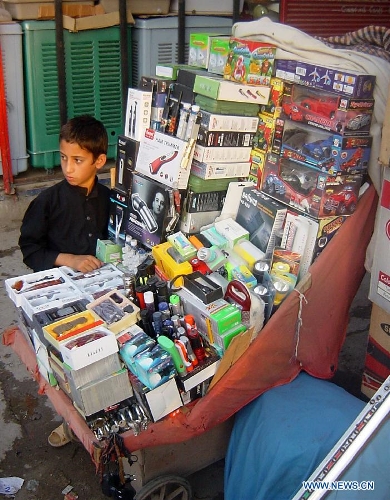Tech firms linked to Congolese child labor
Tesla, Apple among firms accused of aiding child labor in Congo
Five of the world's largest tech companies have been accused of being complicit in the death of children in the Democratic Republic of Congo forced to mine cobalt, a metal used to make telephones and computers, in a landmark lawsuit.

The companies were part of a system of forced labor that the families claimed led to the death and serious injury of their children, it said.
It marked the first time the tech industry jointly has faced legal action over the source of its cobalt.
Images in the court documents, filed in US District Court in Washington DC, showed children with disfigured or missing limbs.
Six of the 14 children in the case were killed in tunnel collapses, and the others suffered life-altering injuries, including paralysis, it said.
"These companies - the richest companies in the world, these fancy gadget-making companies - have allowed children to be maimed and killed to get their cheap cobalt," Terrence Collingsworth, an attorney representing the families, told Reuters.
Cobalt is essential in making rechargeable lithium batteries used in millions of products sold by the tech industry.
More than half of the world's cobalt is produced in Congo.
Global demand for the metal is expected to increase at 7 percent to 13 percent annually over the next decade, according to a 2018 study by the European Commission.
In response to a request for comment, Dell said in an email that it has "never knowingly sourced operations" using child labor and has launched an investigation into the allegations.
Tesla, Apple, Google, Microsoft and Glencore did not immediately respond for comment.

A boy sells toys on World Day Against Child Labor in northwest Pakistan's Peshawar on June 12, 2014. (Xinhua/Ahmad Sidique)
The legal complaint on behalf of 14 families from Congo was filed on Sunday by International Rights Advocates, a US-based human rights nonprofit, against Tesla Inc, Apple Inc, Alphabet Inc, Microsoft Corp and Dell Technologies Inc.The companies were part of a system of forced labor that the families claimed led to the death and serious injury of their children, it said.
It marked the first time the tech industry jointly has faced legal action over the source of its cobalt.
Images in the court documents, filed in US District Court in Washington DC, showed children with disfigured or missing limbs.
Six of the 14 children in the case were killed in tunnel collapses, and the others suffered life-altering injuries, including paralysis, it said.
"These companies - the richest companies in the world, these fancy gadget-making companies - have allowed children to be maimed and killed to get their cheap cobalt," Terrence Collingsworth, an attorney representing the families, told Reuters.
Cobalt is essential in making rechargeable lithium batteries used in millions of products sold by the tech industry.
More than half of the world's cobalt is produced in Congo.
Global demand for the metal is expected to increase at 7 percent to 13 percent annually over the next decade, according to a 2018 study by the European Commission.
In response to a request for comment, Dell said in an email that it has "never knowingly sourced operations" using child labor and has launched an investigation into the allegations.
Tesla, Apple, Google, Microsoft and Glencore did not immediately respond for comment.
